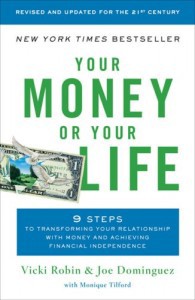Book Thoughts: Your Money or Your Life
Your Money or Your Life (YMOYL) focuses on the philosophy of money. This book is not the type of finance book that is full of quick fixes, very technical data, or the latest trends. It goes to the root of where money started, why we use it, and how much it controls our lives. I would imagine that most people that read this book have an epiphany about how dependent humans (at least in industrialized countries) have become on money.
People slave all week (and even on weekends) for this thing called money. They use it for many reasons. Some come from necessity and others do not. The book is actually based on the principal of Financial Independence. Once you get a handle on your finances and completely understand the ins and outs of your money, you can say goodbye to your ignorance. From that point on, you can live your life without worrying about money.
The nine steps that the book has to becoming financially independent are:
- Making Peace with the Past: In this chapter they have you calculate (as close as you can) how much money you have made in your life and then how much you money you have now. This is a starting point to see how much money you have spent and how much you have to show for all of your hard work (savings, investments, assets). This can be quite scary.
- Determine your True Hourly Rate: You first calculate how much extra time and money you spend for your job. Next you relate it to how many hours you actually spend at work. This allows you to figure out what your actual hourly dollar rate is. Do you drive an hour each way? Do you have to maintain an expensive wardrobe? Do you eat dinner out or spend money unwinding on the weekends because you are drained from your job? This all adds up.
- Track all your expenses: Every time you spend money, track it. You can do this on paper or by using computer software such as Excel or Quicken. Next, categorize the expenses (Food, Transportation, Housing, etc.) and convert them into hours of life energy spent on getting them.
- Determine what Categories give your life "worth": You want your life’s focus to be on the things you are currently spending all of your time and energy on. They ask three potential life changing questions. "Did I receive fulfillment, satisfaction, and value in proportion to life energy spent?", "Is this expenditure of life energy in alignment with my values and life purpose?", and "How might this expenditure change if I didn't have to work for a living?"
- Charting Your Progress: You make a chart to map your income, expenses, and savings over time. It is used as a motivational tool by having it out in the open and public in your home. It will remind you of your purpose for not going out to eat so much or buying the latest gadget. It becomes a competition to increase the gap between your income and expenses (in the positive direction, mind you).
- Decreasing Expenses: Tips for living frugally. There are many different ways suggested here of how to save money throughout all aspects of your life. I have read many lists like this, so I had heard many of them before, but I would almost guarantee that there is a tip there for everyone.
- Increase your income: Valuing your life energy. This chapter discusses ways to continually increase your pay through means that you might not have thought of. Ideas include strengthening your current job, taking side jobs, selling extra "things" and more.
- Reaching the Crossover Point: This is the end goal. When you are at this stage your interest off your savings and investments surpasses your monthly expenses. This is when you can quit the job you hate, spend more time with the people in your life, read the books you been putting off, etc.
- Maximizing your Investments: The last chapter focuses on how to manage your finances for a lifetime. Stocks, bonds, indexes, etc.
One aspect of this book that I really enjoyed was the amount of personal accounts relating to the different topics they were discussing. These put a personal touch on the chapters and changed up the pace when needed. These accounts come from people that have gone through the YMOYL program and are twenty, thirty, forty years out of it. Learning that financial independence is an ongoing journey of both success and failure is reassuring.
Should you read this book? Anyone at any financial point in their life could benefit from Your Money or Your Life. While there are other books that relate better to specific areas of personal finance (debt, investing, etc.), reading one book on finance is not how you become financially independent. For an all encompassing book for someone that really wants to tackle their finances, this would be my first recommendation.

